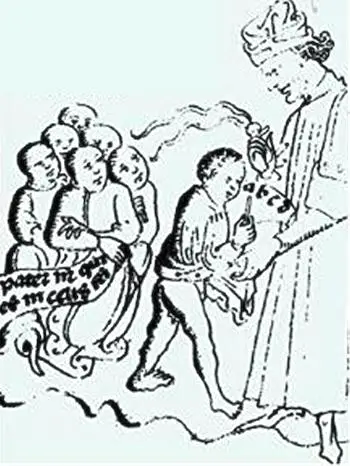Rushing into a decision may cause mistakes that waste more time than would have been taken by proceeding more carefully.
Haste makes waste
What's the meaning of the phrase 'Haste makes waste'?
What's the origin of the phrase 'Haste makes waste'?
This proverbial saying is a variant of more haste, less speed and conveys the same notion as ‘a stitch in time saves nine‘. As is often the case with proverbs, there is conflicting advice – ‘time waits for no man‘ and ‘strike while the iron is hot‘.
his customary pose, that is, flogging a
schoolboy. If reports from his Tudor
contemporaries are correct, this is a pastime
he was unusually enthusiastic about.
It is first found in the Tudor scholar Nicholas Udall’s translation of the proverbs of Erasmus – Apophthegmes, 1542. Actually it seems churlish to give the one word title of Udall’s book when he went to such trouble to give it this grand one – Apophthegmes that is to saie, prompte, quicke, wittie and sentencious saiynges, of certain emperours, kynges, capitaines, philosophiers and oratours, aswell Grekes, as Romaines, bothe veraye pleasaunt [et] profitable to reade, partely for all maner of persones, [et] especially gentlemen. First gathered and compiled in Latine by the ryght famous clerke Maister Erasmus of Roterodame. And now translated into Englyshe by Nicolas Vdall.
The line in question is the simple proverb itself, which appears in the index:
Haste maketh waste
The index points to a page number but that page doesn’t contain the proverb, but does skirt around it:
For men ought to begynne thynges fair & soltely & to procede by litle & litle, because that suche persones as dooe make moste hast in ye begynnyng haue comunely (accordyng to our englishe prouerbe) wurst speede toward ye endyng.
A few years later John Heywood included the proverb in his 1546 glossary A Dialogue conteinyng the nomber in effect of all the Prouerbes in the Englishe tongue:
Som thyngs that prouoke yong men to wed in haste
Show after weddyng that haste maketh waste.
Heywood seemed to disapprove of haste – he also listed ‘more haste, less speed‘. In particular, and this may have been due to his personal experience, he seems especially critical of rushing into marriage. He married at 26, which was young by the standards of courtiers of 16th century England, although there’s nothing recorded of his having regrets at doing so. As for us, we might applaud his marriage as, without it, we wouldn’t have the works of his grandson John Donne to appreciate.
[My thanks to Peter Lukacs, ElizabethanDrama.org for discovering the Udall text.]
See also: the List of Proverbs.
The history of “Haste makes waste” in printed materials
Trend of haste makes waste in printed material over time
Related articles
Related phrases and meanings
Browse more Phrases
About the Author

Phrases & Meanings
A-Z
A B C D E F G H I J K L M N O P Q R S T UV W XYZ
Categories
American Animals Australian Bible Body Colour Conflict Death Devil Dogs Emotions Euphemism Family Fashion Food French Horses ‘Jack’ Luck Money Military Music Names Nature Nautical Numbers Politics Religion Shakespeare Stupidity Entertainment Weather Women Work
How did we do?
Have you spotted something that needs updated on this page? We review all feedback we receive to ensure that we provide the most accurate and up to date information on phrases.
